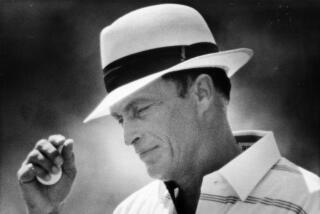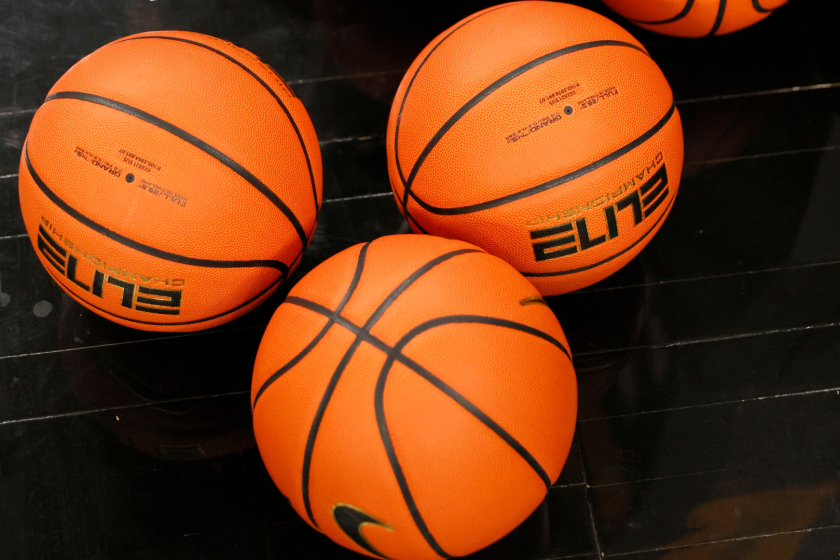Athletes Today Owe Bulla a Lot
- Share via
LITCHFIELD PARK, Ariz. — For a golf buff, it was a “Field of Dreams” all right. There, right on the fairways, were storied names of the past, names right off the portrait walls of the golf Hall of Fame.
It was runaway nostalgia. It turned the clock back. It was the ‘30s, ‘40s, early ‘50s again. A better time.
These silhouettes on the courses of the Wigwam Resort were once some of the more famous in the game, names the modern galleryite has only heard of.
They call themselves the “super-seniors,” guys 60 and over. Some of them 80 and over. All are athletic marvels.
There was Jug McSpaden, a player out of the Golden Age. Jug is 85 and holding. He quit the game initially in 1946 to go into business--which tells you all you need to know abut the economics of pro golf in his day when you got to be a year’s leading money winner with $36,000 in the till.
He won 35 tournaments. And when he didn’t win, he was usually second. He was such a scourge of the fairways that he and Byron Nelson were known in the golfing press as the “Gold Dust Twins.” The year Nelson won 19 tournaments, McSpaden won most of the rest.
It’s still a good idea to get strokes from him.
There was Freddy Hawkins, who spoiled one of the best lines in the game. In his day, he was hailed far and wide as “the greatest player who has never won a tournament.” Freddy was like Greg Norman. He was a top-10 player who usually found a way to lose a tournament on the back nine Sunday. Then he won a tournament and obliterated his identification and spoiled a good story.
There was old “Thunder and Lightning” himself, Terrible Tommy Bolt, mellow now, able to look a double bogey in the face without throwing his bag into a lake or his shoes against a locker. Tommy was of the Ben Hogan-Sam Snead-Jimmy Demaret-Jack Burke-Dutch Harrison age and on certain weeks was the best of them. Consensus was, he would have won twice as many tournaments as he did--14--if he could have had more forbearance with bad shots. But he wouldn’t have been as much fun.
There was Paul Runyan, the little giant killer who probably had the best short game of any golfer who ever lived. So deadly was he that the tour bosses briefly experimented with enlarging the hole to take away his advantage. When he began chipping in, they narrowed the hole again. Runyan went into golf lore when he beat Snead in the 1938 PGA Championship, eight-up with seven to play, golf’s version of a one-round knockout, David slaying Goliath with a wedge.
There was Jerry Barber, like Runyan small but mighty, as persistent as an insurance salesman, as dogged as a Scotland Yard inspector. He played a grim, no-mistake game of a guy in a poker hand on short money.
They were all on hand at the 1993 World Champions of Golf at the storied Wigwam in suburban Phoenix over the weekend, a festival of nostalgia, a return to the past, a reminder that golf is a game for the ages--all ages.
There was Dow Finsterwald, who was never--well, almost never--off a fairway in his career.
And, there was Johnny Bulla.
Who? you may ask.
Johnny Bulla. As historic a figure in golf as Auld Tom Morris.
Johnny won on the tour, but it is not his record that makes him notable.
You know how commercial tie-ins are a big part of today’s game? How golfers shill for corporations? How basketball players become complicated shoe salesmen?
In a way, it all started with Johnny Bulla.
It’s hard to imagine now, but commercial America was slow to latch on to how the sportsman could be an important sales leader. Babe Ruth put his signature on a bat, Bill Tilden on a tennis racket, but the linkage of business to sport was tenuous at best.
In the late ‘30s, a drugstore chain, Walgreen’s, approached Johnny Bulla with the novel idea that he was to endorse a cut-rate golf ball that would be sold over the counter and not only in golf’s pro shops.
The golf establishment was outraged. It ostracized Bulla, kicked him out of the PGA. He had to scramble to get into tournaments.
Nobody wanted a bargain ball to compete with the Titleists, Spaldings, MacGregors and Dunlops. The pros’ worst nightmare was that this (ugh!) drugstore ball would wind up winning a tournament some day somewhere.
In 1941, it did. Johnny teed it up in the L.A. Open at Riviera that year with his 25-cent pelota. In the third round, he was leading the tournament when he teed off with two of the game’s stars.
They decided to trick Bulla. One of them--Bulla declines to identify him to this day--walked over, pretended to check his ball on the fairway, looked at it, then walked away. Bulla assumed, since it apparently was not the other player’s ball, it must be his.
He played it. Immediately, his playing partners were ecstatic. “We’ve got him!” they cried. They had gulled him into playing the wrong ball. Two-stroke penalty.
They yelled too soon. Bulla--and Walgreen’s--won the tournament anyway.
There were other pressure points. Philip Isley, the head of the prestigious Wilson Sporting Goods, which had a contract with Snead, called Sam in and threatened to drop the contract unless he quit traveling to tournaments and rooming with Johnny Bulla.
Sam was outraged. “You can pick my clubs but I pick my friends,” he said.
When Samuel Walgreen died, Bulla received a call from Gen. Leonard Wood, head of Sears Roebuck: “We know what you did for Walgreen. We’d like you to do that for us, only we’d like to add clubs and clothing to the endorsement.”
Bulla did. Sales soared--from 1 million to 6 million in a year.
Corporate outings are commonplace today, but Johnny Bulla was a pioneer in the arrangement. He didn’t merely give his name to the product, he gave his presence.
Bulla was also the first to fly his own plane, a DC-3, to tournaments, predating Arnold Palmer by decades. Ben Hogan, no less, was his co-pilot on some trips.
He was one of the straightest drivers in golf. He finished second in two British Opens and hit every fairway in both of them, still a record. He was second at the ’49 Masters and missed only four fairways.
Any storefront lawyer today would have gotten Bulla’s suspensions lifted and his harassment remunerated.
Is Bulla bitter? He laughs.
“It made me a better person,” he said. “You know, the only thing we really do in this life is learn. We all learned.”
Golf certainly did. Bulla is amused as he sees golfers sponsoring chain-store clothing lines, golf balls from any source, equipment, resorts, airlines and whatever else corporate America wants.
“I overcame it,” he said. “Golf outgrew it and so did I.”
It was just another hard par five with water on the right and a railroad track and gorse on the left. Johnny Bulla could always handle that.
More to Read
Go beyond the scoreboard
Get the latest on L.A.'s teams in the daily Sports Report newsletter.
You may occasionally receive promotional content from the Los Angeles Times.










